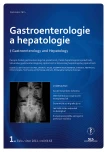-
Články
- Vzdělávání
- Časopisy
Top články
Nové číslo
- Témata
- Kongresy
- Videa
- Podcasty
Nové podcasty
Reklama- Kariéra
Doporučené pozice
Reklama- Praxe
Is it possible to reintroduce original biological therapy in a relapsed Crohn’s disease patient?
Authors: T. Zamborský; B. Desatová; I. Páv; M. Bátovský
Authors place of work: Gastroenterologická klinika SZU a UNB Bratislava
Published in the journal: Gastroent Hepatol 2011; 65(1): 33-35
Category: IBD: kazuistika
Summary
Biological therapy has brought progress in the treatment of inflammatory bowel disease. It significantly improves the quality of patient’s life and postpones the surgical intervention. On the other hand, it raises the problem of its side effects, such as lymphoproliferative diseases in particular. Due to the risk of adverse side-effects of long-term treatment with biological agents, it is necessary to consider the options for stopping biological treatment without increasing the risk of relapse. In the case of relapse following discontinuation of biological therapy due to deep remission, it should be noted that in most cases it is possible to return to the previous biological therapy. In the vast majority of patients, the reintroduction of therapy is successful, and well tolerated. In our case we present a patient with Crohn‘s disease in deep remission during infliximab therapy and acute exacerbation after its discontinuation. The readministration was successful and no complications were recorded one and half years after the cessation of infliximab therapy.
Key words:
biological therapy – infliximab antibodies – TNF-alpha inhibitors risk of malignancy
Zdroje
1. Baert F, Moortgat L, Van Assche G. Mucosal healing predicts sustained clinical remission in patients with early-stage Crohn´s disease. Gastroenterologigy 2010; 138(2): 463–468.
2. Baert F, Noman M, Vermeire S et al. Influence of immunogenicity on the long-term efficacy of infliximab in Crohn’s disease. N Engl J Med 2003; 348(7): 601–608.
3. Rutgeers P, Sandborn WJ, Feagan BG et al. Infliximab for induction and maintenance therapy for ulcerative colitis. N Engl J Med 2005; 353(23): 2462–2476.
4. Bongartz T, Sutton AJ, Sweeting MJ et al. Anti-TNF antibody therapy in rheumatoid arthritis and the risk of serious infections and malignancies: systematic review and meta-analysis of rare harmful effects in randomized controlled trials. JAMA 2006; 295(19): 2275–2285.
5. Miehsler W, Novacek G, Wenzl H et al. A decade of infliximab: The Austrian evidence based consensus on the safe use of infliximab in inflammatory bowel diseasea. JCC 2010; 4 : 221–256.
6. Askling J, Fored CM, Baecklund E. Haematopoietic malignancies in rheumatoid arthritis: lymphoma risk and characteristics after exposure to tumour necrosis factor antagonists. Ann Rheum Dis 2005; 64 (10): 1414–1420.
7. Wolbink GJ, Vis M, Lems W. Development of antiinfliximab antibodies and relationship to clinical response in patients with rheumatoid arthritis. Arthritis Rheum 2006; 54(3): 711–715.
8. Radstake TR, Svenson M, Eijsbouts AM. Formation of antibodies against infliximab and adalimumab strongly correlates with functional drug levels and clinical responses in rheumatoid arthritis. Ann Rheum Dis 2009; 68(11): 1739–1745.
9. Bartelds GM, Wolbink GJ, Stapel S. High levels of human anti-human antibodies to adalimumab in a patient not responding to adalimumab treatment. Ann Rheum Dis 2006; 65(9): 1249.
10. Bartelds GM, Wijbrandts CA, Nurmohamed MT. Clinical response to adalimumab: relationship to anti-adalimumab antibodies and serum adalimumab concentrations in rheumatoid arthritis. Ann Rheum Dis 2007; 66(7): 921–926.
Štítky
Dětská gastroenterologie Gastroenterologie a hepatologie Chirurgie všeobecná
Článek Tahle země není pro mladýČlánek Nejen NOTESy v Barceloně
Článek vyšel v časopiseGastroenterologie a hepatologie
Nejčtenější tento týden
2011 Číslo 1- Horní limit denní dávky vitaminu D: Jaké množství je ještě bezpečné?
- Metamizol jako analgetikum první volby: kdy, pro koho, jak a proč?
- Nejlepší kůže je zdravá kůže: 3 úrovně ochrany v moderní péči o stomii
-
Všechny články tohoto čísla
- Dynamická scintigrafie jícnu v diagnostice refluxní choroby jícnu
- Autoimunní forma chronické pankreatitidy a IgG4 pozitivní mastitida
- CMV kolitida po orgánových transplantacích
- Úspěšné použití klipu OTSC® (Over-The-Scope Clip) při léčbě iatrogenní perforace tračníku
- Je možný návrat k pôvodnej biologickej liečbe u pacienta s Crohnovou chorobou?
- Jak postupovat při ztrátě odpovědi na biologickou léčbu u nemocných s idiopatickými střevními záněty?
- Úvodník vedoucího redaktora časopisu
- Nejen NOTESy v Barceloně
- Kalendář gastroenterologických akcí 2011
- Tahle země není pro mladý
- Akútna mezenteriálna ischemia
- Gastroenterologie a hepatologie
- Archiv čísel
- Aktuální číslo
- Informace o časopisu
Nejčtenější v tomto čísle- CMV kolitida po orgánových transplantacích
- Je možný návrat k pôvodnej biologickej liečbe u pacienta s Crohnovou chorobou?
- Akútna mezenteriálna ischemia
- Autoimunní forma chronické pankreatitidy a IgG4 pozitivní mastitida
Kurzy
Zvyšte si kvalifikaci online z pohodlí domova
Autoři: prof. MUDr. Vladimír Palička, CSc., Dr.h.c., doc. MUDr. Václav Vyskočil, Ph.D., MUDr. Petr Kasalický, CSc., MUDr. Jan Rosa, Ing. Pavel Havlík, Ing. Jan Adam, Hana Hejnová, DiS., Jana Křenková
Autoři: MUDr. Irena Krčmová, CSc.
Autoři: MDDr. Eleonóra Ivančová, PhD., MHA
Autoři: prof. MUDr. Eva Kubala Havrdová, DrSc.
Všechny kurzyPřihlášení#ADS_BOTTOM_SCRIPTS#Zapomenuté hesloZadejte e-mailovou adresu, se kterou jste vytvářel(a) účet, budou Vám na ni zaslány informace k nastavení nového hesla.
- Vzdělávání



